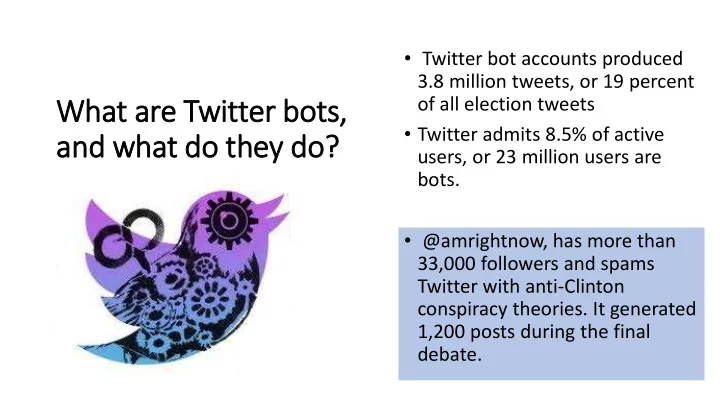

• Twitter bot accounts produced 3.8 million tweets, or 19 percent of all election tweets What a are Twitter r bots, • Twitter admits 8.5% of active and w what do they do? users, or 23 million users are bots. • @amrightnow, has more than 33,000 followers and spams Twitter with anti-Clinton conspiracy theories. It generated 1,200 posts during the final debate.
Social media have been extensively praised for increasing democratic discussion on social issues related to policy and politics. However, what happens when this powerful communication tools are exploited to manipulate online discussion, to change the public perception of political entities, or even to try affecting the outcome of political elections? In this study we investigated how the presence of social media bots, algorithmically driven entities that on the surface appear as legitimate users, affect political discussion around the 2016 U.S. Presidential election. By leveraging state-of- the-art social bot detection algorithms, we uncovered a large fraction of user population that may not be human, accounting for a significant portion of generated content (about one-fifth of the entire conversation). We inferred political partisanships from hashtag adoption, for both humans and bots, and studied spatio-temporal communication, political support dynamics, and influence mechanisms by discovering the level of network embeddedness of the bots. Our findings suggest that the presence of social media bots can indeed negatively affect democratic political discussion rather than improving it, which in turn can potentially alter public opinion and endanger the integrity of the Presidential election.
Bot-or or-Not ot Detection on
Qualities of a • Customized profile twitter bot • Absence of geographical data • Frequency (excessive, incessant) • Proportion of retweets • Followers vs. followees • Randomness of username
Handle and Score Bot or Not Notes original content, way more followers than 0 following ('@strng', 0.18) 0 comedian. original jokes ('@biloon', 0.25) original content, in conversations, not linking to 0 websites ('@katevnelson', 0.26) repetitive tweeting, but more like an unfamiliar 0 user. used infrequently. no links to sites. ('@MadonnaHaigh', 0.41) hard to guess, but each tweet is unique, but is following 3x more people than following this 0 person. ('@Btysheen', 0.42) ('@kikionfleek', 0.49) 0 Original tweets, has tumblr, similar followers/followees ('@TheRepostNews', 0.62) 1 “We spread news written by others”. Minimal followers, thousands of tweets
15% of tweets come from bots 75% were pro trump
Negative ve Impacts & & Concern rns • Bots are being very effective at spreading information in the human population • Gaming of online polls • Shutting down human users • Use AI to chat with humans • Difficult for humans to discern what is real vs bot
• Public sphere and the manufacture of public opinion • Invasion of public sphere for Theoretical profit motives Implications • Homogenous news and news production • Myth of public opinion is the only legitimate basis for domination • Cultural hegemony vs. rule by force • Ideology “Common Sense”
• What percentage of tweets during political events (ie #womensmarch) are bots? • What are the most common words used by bots during Research Questions these events? • Politically, do these bots seem to be promoting right or left ideas? • Is there a threshold after which bots enter a political discussion?
• Was the public sphere a lie before Twitter bots, anyway? • What is significantly different about Further automated ideology as opposed to questions human produced ideology? • Should twitter be doing anything about bots? What is the responsibility of a corporation in its interaction in the public sphere?
Recommend
More recommend